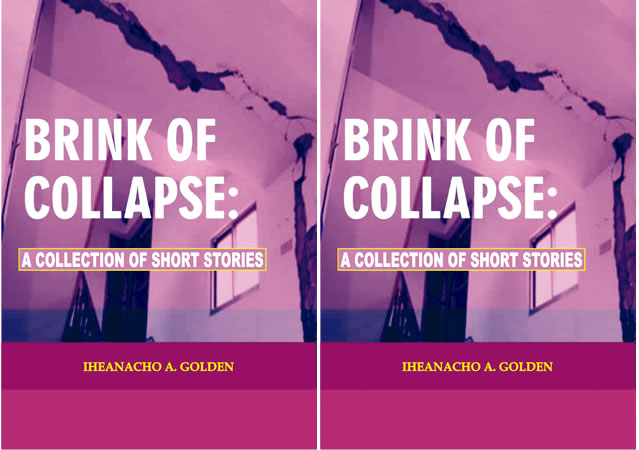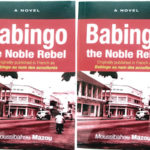A review of Iheanacho Golden’s Brink of Collapse By Folorunsho Moshood.
IN psychology, family problems represent a unique, but common category of adjustment disorder that makes people seek all kinds of solutions including spiritual and psychological treatments anywhere. Problems can develop in a family because of an unresolved social or medical or psychological issue in either parent, or in both or in one of their children. Parent-child problems can also create distress within a family. Lack of trust, poor communication, constant conflict, lack of closeness, sexual dysfunction, in-law intrusion and indiscipline within the family can cause family problems. These problems, if not addressed or tackled head on, can lead to broken home, divorce, extra-marital affair and stepfamily.
Iheanacho Golden’s ‘Brink of Collapse’, a collection of three short stories, written in first person narrative presents two spellbinding tales of familial problems and another thrilling tale of academic trouble, and explores features of adolescent behaviours and youthful exuberance to educate the reader on trust, authentic hope, love, hatred, lust, confidence, self-respect and home training. The collection also deals with indecent behaviour, sexual harassment, sex-for-grade issue and assassination thereby weaving several themes together to create interesting plots with twists and turns, suspense and academic and marital tension. The dialogues in this collection are so robust and lucid.
This 111-page collection, a 2021 publication of OAK Initiative, the publishing arm of OAK Foundation, a charity organisation aimed at supporting indigent students, widows and the fatherless in Africa has the following three short stories, ‘The Retrial’, ‘Vindication’, and ‘Hope’. The three stories have one thing in common – they all have happy endings.
The first story, ‘The Retrial’, which has its setting in Femi’s household, is divided into four parts.
The story has Ebunoluwa, Femi’s wife as the protagonist. They have two daughters and a son – Omotoke/Elizabeth, Modupeoluwa and Tobiloba respectively. Their marriage is at the brink of collapse due to poor communication and lack of trust. Boredom, the common cold of the psyche, has set in turning love to hatred and leading them straight to sexual dysfunction in their relationship that has produced three children. This crack in the wall of Femi’s family almost allows wall-geckos access to the household. First, their eldest child, Omotoke nurses a desire for sexual experimentation and later goes for the real sexual training in Chris’ house. Secondly, Femi’s behaviour of coming home late with no apology to anyone leads to a suspicion of another woman outside, which later pushes Ebunoluwa to almost do the unthinkable using the opportunity of the date with her boss, Adekunle. At the end, it is improved communication that ditches the glitch of their relationship, repairs the cracked wall of the marriage, and saves the family from the brink of collapse.
‘Vindication’, the second and shortest story in this collection is divided into three parts. It has a university campus as its setting with Sewa Babatunde, a 400-level student, who purportedly fails ACC 412 paper, as the protagonist.Sewa who decides to query the lecturer in charge of ACC 412, Professor Emmanuel Gbadero Ajayi about the mark he allotted to her. She later meets the lecturer in his office, and to her chagrin, Professor Ajayi is a lecturer who engages female students in illicit sexual behaviour of sex-for-grade practice. But she is desperate not to have an extra year, so she strikes a deal with Professor Ajayi. Few hours after striking the deal, Professor Ajayi shuffles off the mortal coil in a suspicious manner and she becomes the prime suspect with a clear-cut motive. She is suspended from school, arrested by the police and charged to court. She is later granted bail. At the end of this thrilling story, Sewa is miraculously vindicated. The twist in this story is that his father’s lawyer, Mr. Oshekun, who is defending her in the case is found to be the murderer of Professor Ajayi. The death of Professor Ajayi has a political undertone.
The third story in this collection, ‘Hope’, is the longest and very histrionic. It is a moving story of seven parts with two protagonists – Bankole (Baba) and Dara, one of Bankole’s twin daughters. The first-person narrative style revolves around the two protagonists. While Dara narrates four parts, Bankole narrates three parts. Bankole’s household is a troubled home with Ronke (Iya) suffering from postpartum psychosis, a severe mental illness characterised by extreme difficulty in responding emotionally to a new-born baby — it can even include thoughts of harming the child. This has been with her since the birth of twins, Dara and Ladun, and the family has also been trying to cope, hoping for the best. The twins always seek refuge in their Uncle Mayowa’s place whenever Iya is in crisis, leaving Baba to deal with the situation through injection, dog’s tranquiliser. The twist in this story is that Baba is also found to be sick, his sickness empowers him to kill. Both parents are sick, psychologically sick, and the twins are in dangerous situation.
Iheanacho Golden’s ‘Brink of Collapse’ has two highly tense spellbinding stories that highlight harsh realities of life and living for many families today. While the two families in ‘The Retrial’ and ‘Hope’ seem to survive the ordeals, some families out there are still battling and struggling with theirs. And what Sewa passes through in the thrilling story ‘Vindication may consume any other student. Just like Iheanacho presents it in a fictional form, may God allow providence and luck to smile on every family and student passing through trials and travails now. The feeling of satisfaction and gladness the characters in the stories make the reader feel is rewarding, endearing and enduring and shows that it’s possible to get through what seems impossible. I recommend this unputdownable collection to every family and female student.






